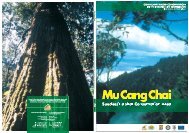Vietnam Primate Conservation Status Review 2002 - Hoang Lien ...
Vietnam Primate Conservation Status Review 2002 - Hoang Lien ...
Vietnam Primate Conservation Status Review 2002 - Hoang Lien ...
You also want an ePaper? Increase the reach of your titles
YUMPU automatically turns print PDFs into web optimized ePapers that Google loves.
<strong>Vietnam</strong> <strong>Primate</strong> <strong>Conservation</strong> <strong>Status</strong> <strong>Review</strong> Part 2: LEAF MONKEYS<br />
174<br />
✱ Prohibition of the trade in threatened animals. As well as hunting, trade of protected primate<br />
species is strictly forbidden by <strong>Vietnam</strong>ese law and any violation is normally subject to<br />
punishment. However, it is still easy to find threatened animals in markets, as much in<br />
rural as in urban markets. Furthermore, in several places, wildlife traders act with impunity,<br />
though they are known by local authorities. These facts reflect that the law is not properly<br />
applied and controls are largely insufficient. A central policy to control commercial use of<br />
wildlife must be developed. The prohibition and punishment of production, use and trade<br />
of traditional medicine made from primate parts must be a priority for primate conservation<br />
given that this is the main motivation for which animals are now hunted. Wildlife trade<br />
control must be extended to zoological gardens. Only animals born in captivity or confiscated<br />
from illegal trafficing should be authorised to enter such institutions. Although a large<br />
proportion of traded animals are probably used locally, a significant part serve to supply<br />
neighbouring countries’ markets, mainly Chinese (Compton & Le Hai Quang, 1998;<br />
Duckworth et al. 1999b, Ngo Van Tri & Day, 1999; Ngo Van Tri & Lormée, 2000). In this<br />
way, international cooperation is required, particularly with regard to destination countries,<br />
such as China and Thailand. Patrolling groups must be increased along the Chinese border<br />
where a significant amount of wildlife products are sold. These measures must be extended<br />
along the border of Lao PDR and Cambodia, from whence much of the <strong>Vietnam</strong>ese market<br />
is supplied and in turn the Chinese market (Martin & Phipps, 1996; Compton & Le Hai<br />
Quang, 1998; Duckworth et al., 1999b).<br />
7.2 Population management<br />
The isolation of forested areas and the reduction of populations due to hunting has resulted in<br />
several primate taxa being limited to small, fragmented sub-populations which are unable to interbreed.<br />
Recent discoveries of locations where endangered primate species occur, and their dramatic decline<br />
in these places suggest that only translocation or ex-situ management could save these individuals<br />
and the loss of the genetic diversity.<br />
Single animals and very small populations could be translocated to areas where other groups exist.<br />
Unfortunately, at the present time no area in <strong>Vietnam</strong> possesses the necessary conditions of safety to<br />
make such a programme viable.<br />
A captive breeding programme cannot be considered as a priority in relation to the in-situ protection<br />
of primate species. However, the Biodiversity Action Plan for <strong>Vietnam</strong> (Government of the Socialist<br />
Republic of <strong>Vietnam</strong> and Global Environment Facility Project VIE/91/G31 1994) lists ex-situ<br />
conservation projects as part of a coordinated species survival strategy. Ex-situ programmes are<br />
recommended for taxa that meet three criteria:<br />
✱ The taxon has a restricted, endemic distribution with a global range of less than 50,000km 2<br />
✱ The taxon is critically endangered<br />
✱ In-situ conservation is failing to obstruct population decline.<br />
All three criteria are met for<br />
✱ Cat Ba langur<br />
✱ Delacour’s langur<br />
✱ Grey-shanked douc langur and<br />
✱ Tonkin snub-nosed monkey



